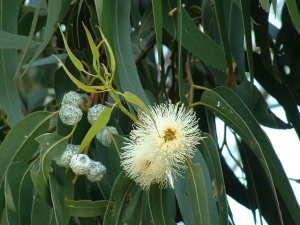Eucalyptus globulus
From Wikiwel
Other Names : Eucalyptus globulus, Gum tree, Blue gum, Southern blue gum, Tasmanian blue gum, Fever tree, Stringy bark
Eucalyptus globulus is an evergreen tree, one of the most widely cultivated trees native to Australia and Tasmania.
Contents
Special Precautions of Eucalyptus
- Due to its 1,8-cineole content, Eucalyptus Globulus Essential Oil may cause CNS and breathing problems in young children. Caution against using Eucalyptus Globulus Oil on or near the face of children under 10. It should not be used on children below 5 years of age.
- Eucalyptus Oil is very toxic when taken orally (no essential oil should be taken internally without the guidance of a qualified aromatherapy practitioner).
- Eucalyptus supplementation is not advisable for children, pregnant women or women who are breastfeeding, older or chronically ill people. It should not be used by people suffering from low blood pressure, kidney problems, intestinal or biliary inflammation, stomach problems, or liver disorders.
- Eucalyptus oil can sometimes cause skin irritation and should therefore be used in moderation. Dermal maximum recommendation is 20%.
- Eucalyptus may affect blood sugar levels. Therefore insulin-dependent diabetics should be carefully monitored if using eucalyptus.
- Eucalyptus may sometimes affect the metabolism. And can interfere with drugs like phenobarbital, aminopyrine, and amphetamine. If you are taking any such medication, avoid the use of eucalyptus.
- The oil may sometimes aggravate bronchial spasms in people suffering from asthma and should not be taken internally in cases of severe liver disease and inflammatory disorders of the kidney and gastrointestinal tract.
- If taken in large doses, it acts as an irritant to the kidneys, by affecting respiration.
- The side effects of internal use of eucalyptus may include nausea, vomiting, and diarrhea.
- Overdoses of eucalyptus oil may cause life-threatening poisonings. Symptoms include a drop in blood pressure, collapse, and asphyxiation. Sometimes initial symptoms of toxicity are vomiting and epigastric pain, followed by nervous system depression and coma.
Health Benefits and Uses of Eucalyptus are
There are many medicinal benefits of Eucalyptus Oil and it is most commonly used in chest rubs, decongestants, cough remedies and muscle & joint ointments.
- most commonly used as a Decongestant. It is quite helpful during winter season, when it is cold. You can put 4-5 drops of eucalyptus oil in a hot compress and apply on the chest. You can also mix 2 drops of Eucalyptus oil in 2 teaspoons of carrier oil and apply as a chest rub.
- To clear the nasal passages, by putting a few drops (2-3) of Eucalyptus oil to a steam inhalation. You can also apply a few drops to a handkerchief and inhale. Eucalyptus oil has is often compared to menthol because it helps to get rid of nasal congestion.
- Good for the respiratory system, and works great for people suffering from congestion, flu or pneumonia.
- To purify a sickroom during illness. You can make a spray by adding 20-25 drops of eucalyptus oil to 300ml of water. Shake the spray properly before each use. This can be sprayed directly into the room to kill the germs.
- as a muscle or joint rub. Mix 3 drops of Eucalyptus oil, 2 drops of lavender oil, and 2 drops of Roman Chamomile to 2 teaspoons of carrier oil and apply on the joints for a soothing effect.
- to keep insects and bugs at bay. Add 3 drops of Eucalyptus oil, 3 drops of lavender oil & 3 drops of Basil and use as an oil vaporiser or diffuser.
- used by athletes to help relieve muscle soreness. It has a warming effect on the skin and muscles, and relieves pain.
- used as a local application for ulcers and sores. 1 OZ. of eucalyptus oil should be added to 1 pint of lukewarm water.
- Its fluid extract is used internally in cases of scarlet fever, typhoid and intermittent fever.
- used as a natural antibacterial spray that can be used in kitchen and bathroom. Add 15 drops of Eucalyptus oil, 30 drops of Tea Tree oil and 20 drops of Lemon to half a litre of water and store in a plant sprayer. Shake well before each use. But remember to dry the surface thoroughly before preparing food, if you have sprayed this solution. However it is not suitable for use on polished wood. Shake it properly before every use.
- to remove tar from clothes. Apply a few drops of Eucalyptus oil to the area and wipe the tar gently using a clean cloth.
- to treat Greenfly and Blackfly infestations on plants.
- in veterinary practice. It is used for parasitic skin infections.
- it is given to horses in influenza, to dogs in distemper and to all animals in septicaemia.
- one of the ingredients of catheder oil, that is used for sterilizing and lubricating urethral catheters.
- When suffering from croup or spasmodic throat troubles, the oil can be freely applied externally.
- Eucalyptus leaves can be used in potpourris, skin lotions and herbal bath.Its oil has a pleasant aroma and cooling properties. You can diffuse Eucalyptus into the air, for a refreshing smell.
- Eucalyptus Oil is sometimes used as a stimulant and antiseptic gargle.
- The antiseptic properties of eucalyptus oil confer some anti-malarial action, but it cannot take the place of Cinchona.
- Tuberculosis (TB) : Research from the University of Illinois’ College of Pharmacy has found that eucalyptus essential oil can be used to stop the spread of tuberculosis from those who are contagious.
Main Combinations
- Respiratory infections : Eucalyptus globulus + Propolis
- Deep Cough : Eucalyptus globulus + Horehound
- Nighttime cough: Eucalyptus globulus + Corn Poppy
- Aphonia : Eucalyptus globulus + Propolis
References
- Robert Tisserand and Rodney Young, Essential Oil Safety (Second Edition. United Kingdom: Churchill Livingstone Elsevier, 2014), 273.
- Julia Lawless, The Illustrated Encyclopedia of Essential Oils (Rockport, MA: Element Books, 1995), 141.
